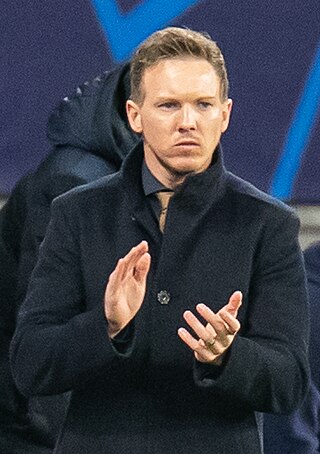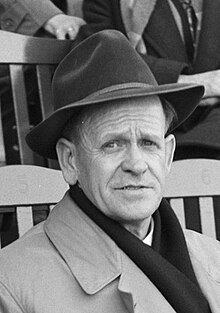
The 1938 FIFA World Cup was the 3rd edition of the World Cup, the quadrennial international football championship for senior men's national teams. It was held in France from 4 to 19 June 1938. Italy defended its title in the final, beating Hungary 4–2. Italy's 1934 and 1938 teams hold the distinction of being the only men's national team to win the World Cup multiple times under the same coach, Vittorio Pozzo. It would be the last World Cup until 1950; the 1942 and 1946 World Cups were cancelled due to World War II.

The Germany national football team represents Germany in men's international football and played its first match in 1908. The team is governed by the German Football Association, founded in 1900. Between 1949 and 1990, separate German national teams were recognised by FIFA due to Allied occupation and division: the DFB's team representing the Federal Republic of Germany, the Saarland team representing the Saar Protectorate (1950–1956) and the East Germany team representing the German Democratic Republic (1952–1990). The latter two were absorbed along with their records; the present team represents the reunified Federal Republic. The official name and code "Germany FR (FRG)" was shortened to "Germany (GER)" following reunification in 1990.

The Austria national football team represents Austria in men's international football competitions, and is controlled by the Austrian Football Association.

Helmut Schön was a German football player and manager. He is best remembered for his exceptional career as manager of the West Germany national team in four consecutive World Cup tournaments, including winning the title in 1974, losing in the final in 1966, and coming in third in 1970. In addition, his teams won the European Championship in 1972 and lost in the final in 1976.
The Miracle of Bern is a 2003 film by Sönke Wortmann, which tells the story of a German family and the unexpected West German miracle victory in the 1954 World Cup Final in Bern, Switzerland.

The 1954 FIFA World Cup final was the final match of the 1954 FIFA World Cup, the fifth World Cup in FIFA history. The game was played at the Wankdorf Stadium in Bern, Switzerland, on 4 July 1954, and saw West Germany beat the heavily favoured Golden Team of Hungary 3–2. Earlier in the group stage, Hungary had defeated West Germany 8–3.
Otto Nerz was a German football player and manager and the first head coach of the Germany national team between 1923 and 1936.

Hans Tilkowski was a German football player and manager. A goalkeeper. he played for West Germany, and was a member of the team that lost the 1966 World Cup final to England.
Below are the squads for the 1938 FIFA World Cup final tournament in France.
Josef "Jupp" Gauchel was a German football striker. In the 1930s, he played for TuS Neuendorf and was an active member of the squad.

Josef "Jupp" Posipal was a German footballer. Born in Romania, he was part of the Germany national team that won the 1954 FIFA World Cup. During his club career he played for SV Linden 07, SV Arminia Hannover, and Hamburger SV.
Edmund Conen was a German footballer who played as a striker.

Herbert "Ertl" Erhard, also known as Herbert Erhardt, was a German footballer who played as a defender.
Paul Mebus was a German footballer.
Heinz Kubsch was a German football goalkeeper.
Erwin Stein was a German professional footballer who played as a forward.
Wolfgang Solz was a German professional footballer who played as a winger.
Dieter Stinka is a German former footballer who played as a midfielder. With Eintracht Frankfurt he won the German championship in 1959 and reached with the club the 1960 European Cup Final against Real Madrid.
Johann Heinrich Herberger was a German football coach and former player.

The Germany national football team manager is a position created in 1926 and first held by Otto Nerz. The German team began playing matches in 1908, but for 18 years it had no manager. Instead a selection committee chose the team.









